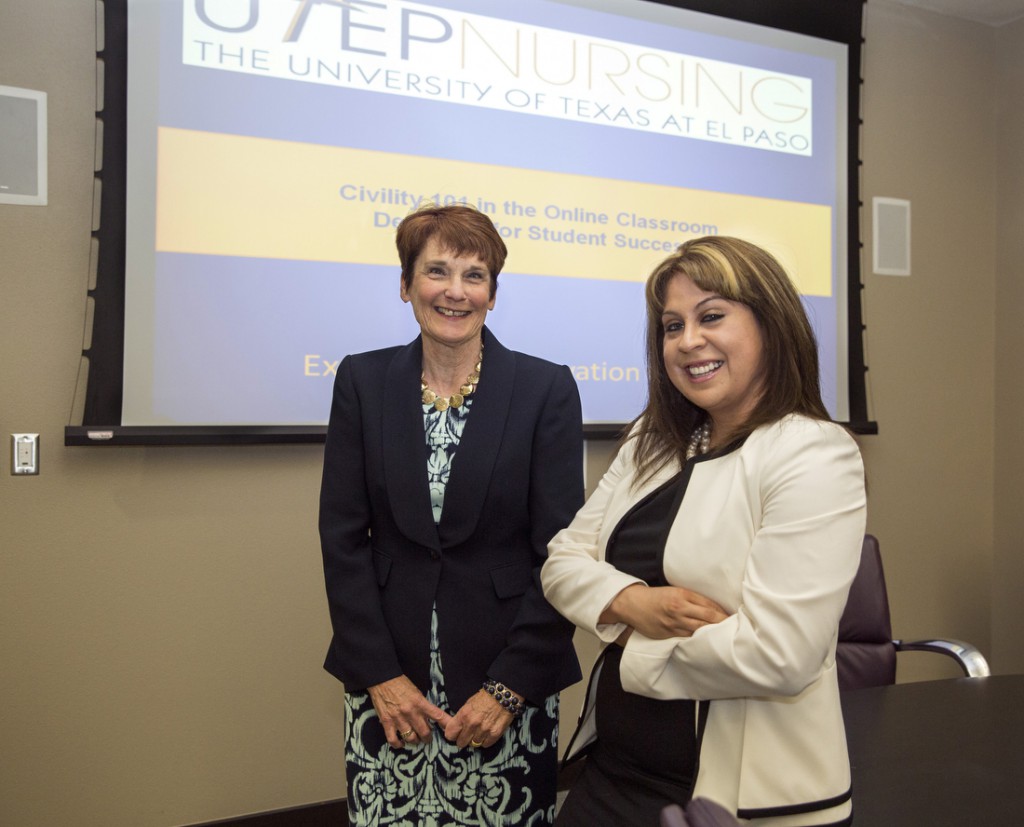Originally published June 19, 2015
By Laura L. Acosta
UTEP News Service
While online learning offers students the flexibility and convenience to learn at their own pace, completing a group assignment in a virtual environment can present stressful challenges that can lead to academic incivility or rude behaviors among group members.
According to a study on incivility in online learning at the UTEP School of Nursing, uncivil behaviors in an online group setting can be a result of communication problems among classmates or other group members who shirk their responsibilities, yet benefit from the hard work of the rest of the group.

“These stresses produced instances of uncivil behavior toward each other, which interfered with the learning environment, creating a digital divide among online group members,” said Ryann Fierro, a graduate student in the Master of Science in Nursing (MSN) program at The University of Texas at El Paso.
Last summer, Fierro was a research assistant on the pilot study led by Diane Monsivais, Ph.D., director of the graduate nursing education program, which measured the perceptions and frequencies of uncivil behaviors in online learning by faculty and students at the UTEP School of Nursing. The study used the survey, “Incivility in the Online Learning Environment,” which identified online group work as one of the major stressful challenges for students in the online MSN program at UTEP.
“For a variety of reasons group work comes up at the top of the list of challenges in online learning,” Monsivais said. “There’s always somebody who doesn’t want to do their share of the work or they have problems communicating.”
As a result, Fierro and Monsivais researched best practices for online work groups to develop strategies to promote civil, successful learning environments.
Fierro and Monsivais will present the findings at the 26th International Nursing Research Congress on July 25 in San Juan, Puerto Rico, sponsored by Sigma Theta Tau International.
Recommendations include emphasizing the value of group work, providing guidance on skills needed to be successful, and establishing goals and outcomes. Fierro also suggested having students sign a working group charter form, or an agreement, that lists the responsibilities of the members.
However, Fierro stressed that faculty members must implement these practices in order for students to follow them. Fierro tested some of these strategies in one of her online classes during the spring 2015 semester. She introduced a working group charter form, which none of the other group members signed. To build rapport with her classmates, Fierro posted a picture of herself online. No one else in the group followed suit.
“Just because I did it doesn’t mean that my colleagues are going to follow and put their picture up,” Fierro said. “The professor also has to implement that in the guidelines and say, ‘Read your group contract. Make sure you sign it and make sure you’re going to abide by the rules.’”
Monsivais plans to incorporate these best practices into her graduate courses this summer. She also plans to get feedback from faculty and students across campus on what they think are uncivil behaviors in online learning. Her goal is to develop effective learning strategies to enhance student and faculty success.
“Online learning produces different kinds of incivility than you would get face-to-face in class because what is the digital equivalent of rolling your eyes at somebody?” asked Monsivais, who has been teaching online courses since 2002. “It happens so much more easily online because if somebody takes the wrong way how you phrased a sentence, they are going to wonder, ‘What did I do wrong?’”
Faculty and students can take the survey on Incivility in the Online Learning Environment on the Academic Technologies website. The survey includes multiple choice questions on what students and faculty consider to be disruptive behavior, such as making rude comments or using inappropriate chat acronyms. Participants also have the opportunity to reflect on behaviors that impact online teaching and learning.
“The more supportive the learning environment is, the less stressed we’re going to be, and we’ll probably tend to be nicer, too,” Monsivais said.
For Fierro, the opportunity to participate in the study reignited her passion for research. As an undergraduate student in the College of Science, Fierro participated in cancer and genetic research. After earning her degree in microbiology from UTEP in 2011, Fierro earned a Bachelor of Science in nursing in 2013 from the University’s fast-track nursing program.
“I never imagined I would be doing nursing research,” said Fierro, who will graduate from the MSN program in December 2015. “It’s fun and it’s different because you’re not in the lab. It’s also a field where research is in demand.”
Monsisvais stressed that nursing research is important to improve both healthcare outcomes and educational outcomes and also mentor the next generation of researchers, like Fierro.
“Most of my research is now on teaching and learning, which is important for the graduate program because it enhances the program,” Monsivais said. “We’re constantly looking for better ways of improving our learning outcomes.”
To participate in the Incivility in the Online Learning Environment survey, click here.